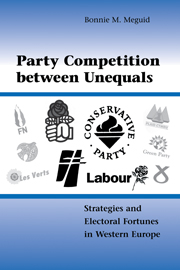Book contents
- Frontmatter
- Contents
- List of Tables and Figures
- List of Abbreviations and Acronyms
- Acknowledgments
- 1 THE NICHE PARTY PHENOMENON
- 2 POSITION, SALIENCE, AND OWNERSHIP: A STRATEGIC THEORY OF NICHE PARTY SUCCESS
- 3 AN ANALYSIS OF NICHE PARTY FORTUNES IN WESTERN EUROPE
- 4 A THEORY OF STRATEGIC CHOICE
- 5 STEALING THE ENVIRONMENTAL TITLE: BRITISH MAINSTREAM PARTY STRATEGIES AND THE CONTAINMENT OF THE GREEN PARTY
- 6 “THE ENEMY OF MY ENEMY IS MY FRIEND”: FRENCH MAINSTREAM PARTY STRATEGIES AND THE SUCCESS OF THE FRENCH FRONT NATIONAL
- 7 AN UNEQUAL BATTLE OF OPPOSING FORCES: MAINSTREAM PARTY STRATEGIES AND THE SUCCESS OF THE SCOTTISH NATIONAL PARTY
- 8 CROSS-NATIONAL COMPARISONS AND EXTENSIONS
- 9 CONCLUSIONS: BROADER LESSONS OF COMPETITION BETWEEN UNEQUALS
- References
- Index
- Cambridge Studies in Comparative Politics
9 - CONCLUSIONS: BROADER LESSONS OF COMPETITION BETWEEN UNEQUALS
Published online by Cambridge University Press: 25 July 2009
- Frontmatter
- Contents
- List of Tables and Figures
- List of Abbreviations and Acronyms
- Acknowledgments
- 1 THE NICHE PARTY PHENOMENON
- 2 POSITION, SALIENCE, AND OWNERSHIP: A STRATEGIC THEORY OF NICHE PARTY SUCCESS
- 3 AN ANALYSIS OF NICHE PARTY FORTUNES IN WESTERN EUROPE
- 4 A THEORY OF STRATEGIC CHOICE
- 5 STEALING THE ENVIRONMENTAL TITLE: BRITISH MAINSTREAM PARTY STRATEGIES AND THE CONTAINMENT OF THE GREEN PARTY
- 6 “THE ENEMY OF MY ENEMY IS MY FRIEND”: FRENCH MAINSTREAM PARTY STRATEGIES AND THE SUCCESS OF THE FRENCH FRONT NATIONAL
- 7 AN UNEQUAL BATTLE OF OPPOSING FORCES: MAINSTREAM PARTY STRATEGIES AND THE SUCCESS OF THE SCOTTISH NATIONAL PARTY
- 8 CROSS-NATIONAL COMPARISONS AND EXTENSIONS
- 9 CONCLUSIONS: BROADER LESSONS OF COMPETITION BETWEEN UNEQUALS
- References
- Index
- Cambridge Studies in Comparative Politics
Summary
Since the 1970s, the political systems of Western Europe have undergone a major transformation. Competition between mainstream parties has been interrupted by the emergence of niche parties, actors that are fundamentally different from their mainstream opponents. The new parties' rejection of the economic focus of politics and their introduction of new and controversial issues have threatened the content of the political debate and the very partisan alignments that ensure mainstream parties' electoral and governmental dominance.
Yet, although they have transformed political arenas across the region, niche parties have experienced wide variation in their electoral success. Hoping to explain why some green, radical right, or ethnoterritorial parties floundered while others flourished, scholars have turned to the institutional and sociological characteristics of the particular political environments. According to these theories, parties fail under restrictive electoral rules or unfavorable economic and societal conditions. Niche party success, therefore, occurs under the opposite conditions: for example, when PR rules are in effect or, in the case of radical right parties, when unemployment and immigrant populations are high.
As the analyses in this book suggest, however, the electoral successes and failures of green, radical right, and ethnoterritorial parties are not merely the reflection of the institutional and sociological environment. Rather, this study finds answers to the puzzle of niche party performance in a factor that has been largely ignored in this literature: party competition. To the extent that institutional and sociological variables underlie a party's success, they are not neutral, exogenously determined variables.
- Type
- Chapter
- Information
- Party Competition between UnequalsStrategies and Electoral Fortunes in Western Europe, pp. 273 - 282Publisher: Cambridge University PressPrint publication year: 2008



